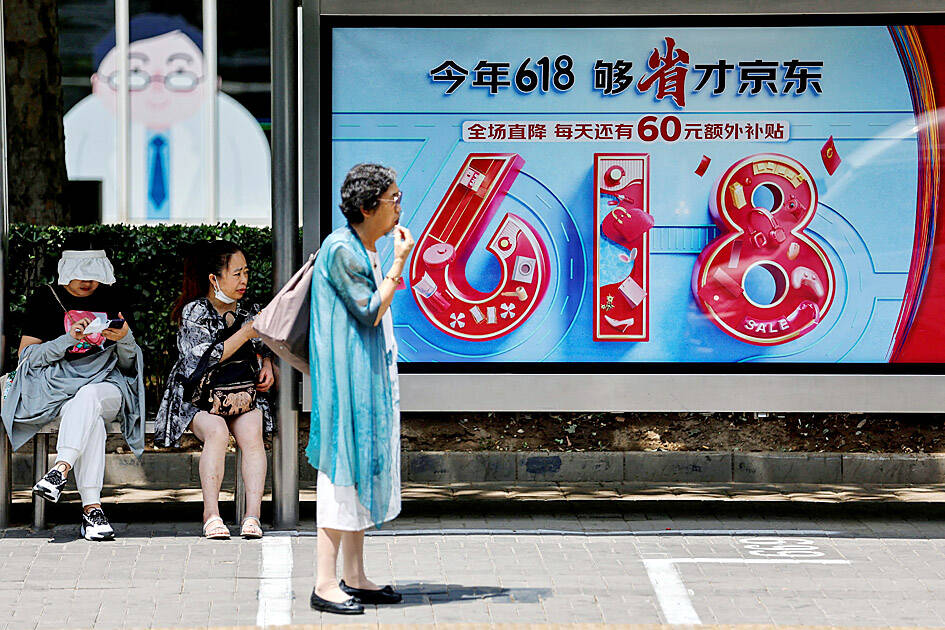China’s mid-year e-commerce sales festival failed to stir up a great deal of excitement among shoppers, industry experts said, even as major platforms extended offers to a weeks-long period to woo belt-tightening consumers amid a gloomy economic outlook.
The 618 festival, named after the June 18 founding date of e-commerce provider JD.com Inc (京東), but embraced by all platforms, is China’s second-biggest annual sales event after Singles Day in November and a key test of household consumption appetite.
“With discounts available year-round, buzz around 618 has diminished,” WPIC Marketing + Technologies chief executive officer Jacob Cooke said.

Photo: Reuters
“But the festival is still generating a GMV bump from baseline and overall GMV should be up slightly from 2023,” he said, referring to gross merchandise volume, a widely used proxy for e-commerce firms’ online sales.
JD.com yesterday said that its turnover and order volumes reached a new high over the festival period, which ran from the end of last month to Tuesday. It did not elaborate on the exact growth rate of its orders or sales during the festival, which was first launched in 2010 as just a one-day sale.
Data from consultancy Syntun (星圖數據) showed that China’s total online sales volume fell 7 percent year-on-year to 742.8 billion yuan (US$102.4 billion) during this year’s 618 festival.
Major players such as JD.com and Alibaba Group Holding Ltd’s (阿里巴巴) Tmall (天貓) and Taobao (淘寶) e-commerce platforms this year canceled a traditional pre-sale period in which shoppers could place deposits on products and complete the purchase during a later sales period. Instead, the sales period itself was extended.
That extension, combined with China’s broader consumer belt-tightening, which is pushing retailers to constantly focus on low prices, also contributed to 618 garnering less enthusiasm than the event once enjoyed, analysts said.
An analysis by consultancy Re-Hub of luxury brand discounting strategies during this year’s 618 festival found that nearly half of the brands they tracked either maintained or reduced their average discounts from the previous year, while 20 percent increased their average discounts.
Alibaba had previously flagged in a mid-618 season update that sectors such as home appliances were outperforming on its platforms, led by brands such as Haier Group (海爾) and Xiaomi Corp (小米).
The e-commerce giant yesterday said that international brands, including Nike Inc, L’Oreal SA, Lancome and Adidas AG, surpassed 1 billion yuan of sales on Tmall during the period.
Apple Inc offered discounts of up to 2,300 yuan on select iPhone models via its Tmall flagship store in a bid to keep pace with domestic competitor Huawei Technologies Co (華為).
Within the first hours of sales, Alibaba said Apple had sold more than 200 million yuan of merchandise.
Given low prices are now such a common feature of China’s consumer landscape, it is becoming more difficult for e-commerce platforms to keep customers engaged — even with traditionally successful sales festivals.
“I haven’t been paying constant attention to 618, to be honest, because there are just so many [shopping festivals],” said Anita Meng, a university student from Hangzhou.
“Even if these festivals are still going strong, my wallet is already exhausted,” she said, adding that she only made one purchase this 618 — a gaming chair for her older brother that was reduced from more than 1,200 yuan to 1,000 yuan.

BYPASSING CHINA TARIFFS: In the first five months of this year, Foxconn sent US$4.4bn of iPhones to the US from India, compared with US$3.7bn in the whole of last year Nearly all the iPhones exported by Foxconn Technology Group (富士康科技集團) from India went to the US between March and last month, customs data showed, far above last year’s average of 50 percent and a clear sign of Apple Inc’s efforts to bypass high US tariffs imposed on China. The numbers, being reported by Reuters for the first time, show that Apple has realigned its India exports to almost exclusively serve the US market, when previously the devices were more widely distributed to nations including the Netherlands and the Czech Republic. During March to last month, Foxconn, known as Hon Hai Precision Industry

Taiwan Semiconductor Manufacturing Co (TSMC, 台積電) and the University of Tokyo (UTokyo) yesterday announced the launch of the TSMC-UTokyo Lab to promote advanced semiconductor research, education and talent development. The lab is TSMC’s first laboratory collaboration with a university outside Taiwan, the company said in a statement. The lab would leverage “the extensive knowledge, experience, and creativity” of both institutions, the company said. It is located in the Asano Section of UTokyo’s Hongo, Tokyo, campus and would be managed by UTokyo faculty, guided by directors from UTokyo and TSMC, the company said. TSMC began working with UTokyo in 2019, resulting in 21 research projects,

Taiwan’s property market is entering a freeze, with mortgage activity across the nation’s six largest cities plummeting in the first quarter, H&B Realty Co (住商不動產) said yesterday, citing mounting pressure on housing demand amid tighter lending rules and regulatory curbs. Mortgage applications in Taipei, New Taipei City, Taoyuan, Taichung, Tainan and Kaohsiung totaled 28,078 from January to March, a sharp 36.3 percent decline from 44,082 in the same period last year, the nation’s largest real-estate brokerage by franchise said, citing data from the Joint Credit Information Center (JCIC, 聯徵中心). “The simultaneous decline across all six cities reflects just how drastically the market

Ashton Hall’s morning routine involves dunking his head in iced Saratoga Spring Water. For the company that sells the bottled water — Hall’s brand of choice for drinking, brushing his teeth and submerging himself — that is fantastic news. “We’re so thankful to this incredible fitness influencer called Ashton Hall,” Saratoga owner Primo Brands Corp’s CEO Robbert Rietbroek said on an earnings call after Hall’s morning routine video went viral. “He really helped put our brand on the map.” Primo Brands, which was not affiliated with Hall when he made his video, is among the increasing number of companies benefiting from influencer